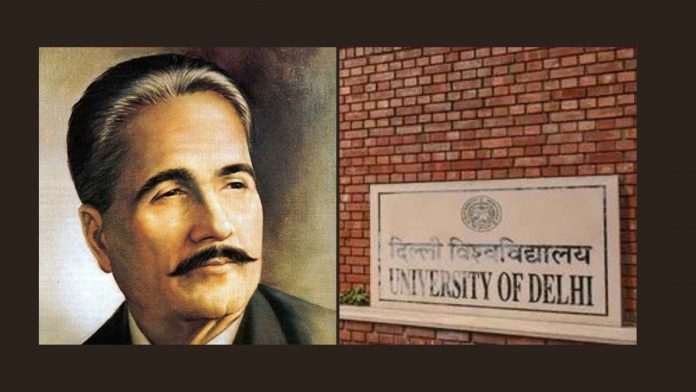by Muslim Mirror Staff

The Academic Council (AC) of Delhi University recently approved several modifications to the syllabi, which notably involved the removal of poet and philosopher Mohd Iqbal from the BA political science curriculum.
Officials have stated that the chapter titled ‘Modern Indian Political Thought’ is currently included in the sixth-semester paper of the BA program. However, following the Academic Council’s decision, the matter will now be presented to the university’s Executive Council for a final decision.
Meanwhile, the Akhil Bharatiya Vidyarthi Parishad (ABVP), which is affiliated with the Rashtriya Swayamsevak Sangh (RSS), expressed its approval of the decision.
“A motion was brought regarding a change in the syllabus of political science. As per the motion, there was a chapter on Iqbal that has been removed from the syllabus,” said an Academic Council member.
One of the units in the syllabus is dedicated to Mohd Iqbal and is titled ‘Iqbal: Community’. This unit is part of a broader course that comprises a total of 11 units. The primary objective of the course is to examine significant themes by studying the ideas and philosophies of various individual thinkers.
In addition to Mohd Iqbal, the course also encompasses the study of other prominent thinkers such as Rammohan Roy, Pandita Ramabai, Swami Vivekananda, Mahatma Gandhi, and Bhimrao Ambedkar.
“The course has been designed to give students a glimpse into the richness and diversity within the Indian political thought,” the syllabus mentions.
The course is aimed to equip students with a critical understanding of modern Indian thought, it adds.
“The thematic exploration of ideas is meant to locate the topical debates on important subjects on a historical trajectory and reflect over the diverse possibilities exhibited in the writings of the respective thinkers,” it further stated.
The ABVP expressed its support for the decision, stating that they believe the renowned scholar Iqbal, whom they describe as a “fanatic theological scholar,” played a significant role in the partition of India.
“Delhi University academic council decided to scrap fanatic theological scholar Mohd Iqbal from DU’s political science syllabus. It was previously included in BA’s sixth-semester paper titled ‘Modern Indian political thought,” the ABVP said in a statement.
“Mohammad Iqbal is called the ‘philosophical father of Pakistan’. He was the key player in establishing Jinnah as a leader in Muslim League. Mohammad Iqbal is as responsible for India’s partition as Mohammad Ali Jinnah is,” it added.
Who was Mohammad Iqbal?
Mohammad Iqbal, also known as Allama Iqbal, was a prominent philosopher, poet, and politician from British India. He was born on November 9, 1877, in Sialkot, Punjab (now part of Pakistan), and he passed away on April 21, 1938, in Lahore, Punjab, British India (now Pakistan).
Iqbal is widely regarded as one of the most influential figures in Urdu literature and is known for his poetic works in both Urdu and Persian languages. His poetry often focused on themes of spirituality, nationalism, and the revitalization of the Muslim community in South Asia.
Apart from his literary contributions, Iqbal was also an eminent philosopher and a strong advocate for the rights and welfare of the Muslim population. He emphasized the importance of selfhood, self-discovery, and the pursuit of knowledge in his philosophical ideas. Iqbal’s concept of “Khudi” (selfhood) called for individuals to realize their full potential and to work towards the betterment of society.
Mohammad Iqbal’s thoughts and writings continue to be widely studied and revered, and he is considered a national poet in Pakistan. His poetry and philosophical ideas have left a lasting impact on the cultural, intellectual, and political landscape of the region.

No comments:
Post a Comment